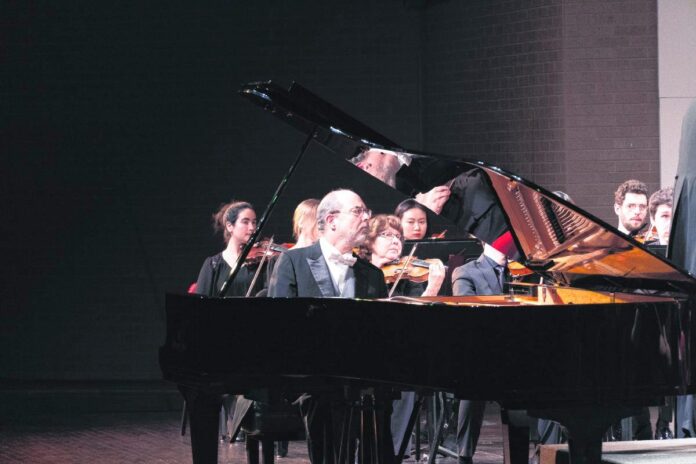Another triumph for the Columbus Indiana Philharmonic Orchestra and its stellar conductor, maestro David Bowden.
An enthusiastic crowd heard an ambitious and challenging concert Saturday that would have been worthy in any concert hall in the United States.
It began with a brief overture titled “The American Dream,” composed by James Beckel, well-known Indiana composer and brass performer who served as principal trombonist for 40 years with the Indianapolis Symphony Orchestra. Opening with brass fanfares, the piece employed each brass section with stirring, march-like music.
Soon we heard a familiar hymn that is a part of every hymnal published in the 20th century: “For the Beauty of the Earth.” The theme was composed in 1838 by Conrad Kocher, and Beckel used it skillfully to bring grace and melodic artistry to his dramatic concert opener.
Following this captivating beginning, we were transfixed by the haunting first measures of Beethoven’s Concerto No. 4 for piano and orchestra in G major. Norman Krieger, brilliant pianist and currently professor of piano at Indiana University Jacobs School of Music was the superb soloist. The performance was replete with splendid music-making at the highest levels by both soloist and orchestra.
Krieger drew from the piano all of the magnificent sounds that the beautiful concert grand had inside. He was able to secure penetrating, sonorous tones matched by gorgeous melodic passages that soared to the heavens. Beethoven asks from the pianist tremendous variety in dynamics, phrasing, pedaling and other details in realization of his mighty score.
Krieger brought out all of the carrying power of even the most tender moments so that not a whisper of sound was lost. This was a stunning performance of one of music’s most astonishing works. The composer himself would surely have thrilled at the execution of his demanding composition by both soloist and orchestra.
Following an enthusiastic standing ovation Krieger returned to the stage to play a ravishing encore of Frederic Chopin’s Nocturne in B flat minor.
The last composition on this exciting and appreciated program was one of the symphonic highlights of the 20th century.
Bowden chose Dmitri Shostakovic’s Symphony No. 5. It’s hard for those of us who have grown up during a major part of the last century to imagine that the government of the United States would have an interest in the musical content of our compositions.
However, Shostakcovic had to contend with persons who had no musical acumen whatsoever making major decisions concerning what pieces could be played or sung at any given time. These same people made wide-ranging comments about their perception of the quality of the compositions.
This was the situation facing Shostakcovic during a large part of his career. He and many of his colleagues were forced to amend their own works because the censors pronounced them “too political,” or “unintelligible to the public.”
His fifth symphony, which we heard so powerfully played was described by the Russian press as “profoundly significant.” Therefore, it escaped the harsh pronouncements that others received and we are free to hear it in all its grandeur. It is hard to overestimate the power of this gargantuan work.
The emotions that it provokes and the angst that one feels during the almost one-hour performance are like almost nothing else we might encounter in the music repertoire. Bowden conducted with great fervor and strength, and his players responded in like manner.
I have said so before, but must do it again: The city of Columbus, Indiana, is fortunate beyond belief to relish and experience the profound contribution that this musical organization makes to cultural life in a wide section of the state of Indiana.





